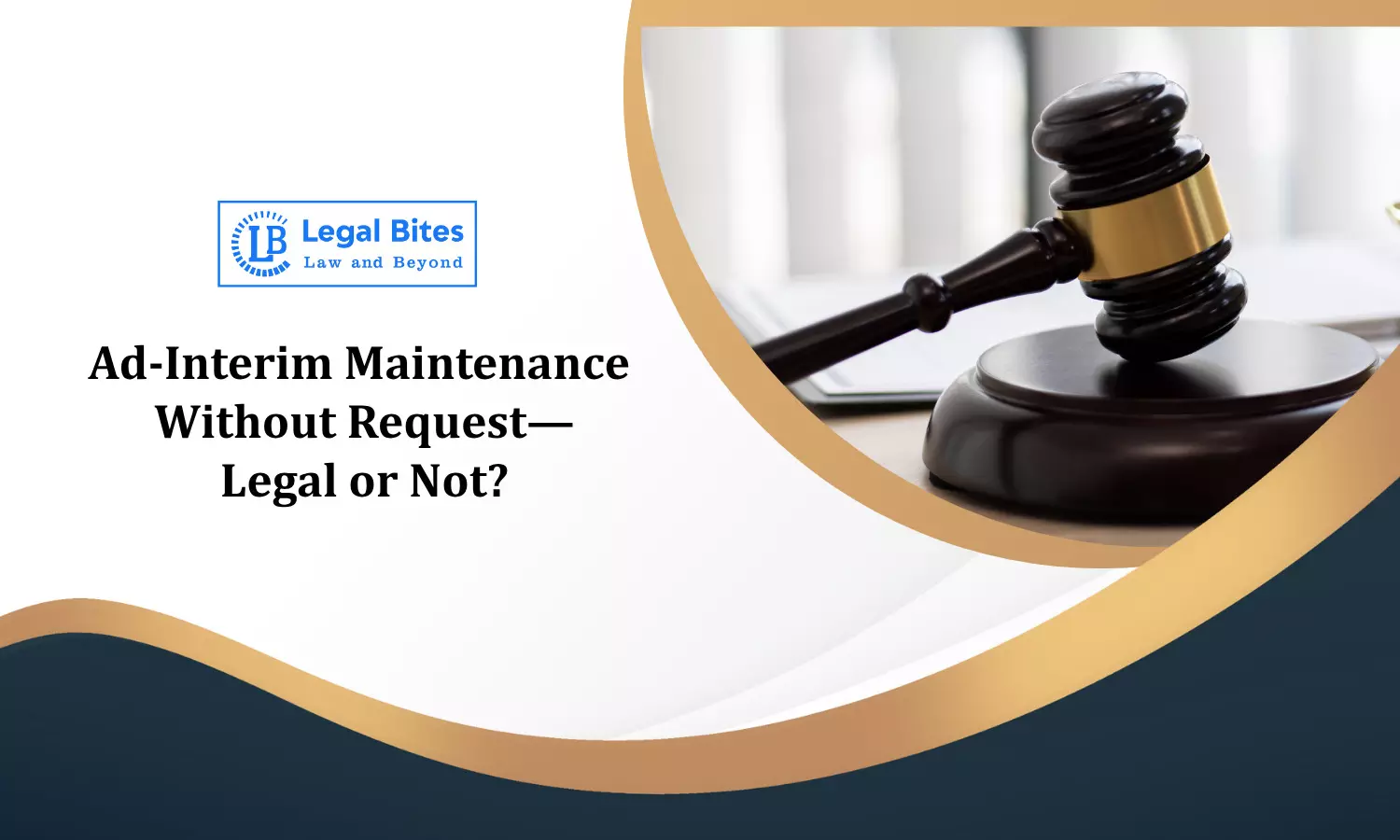
The grant of maintenance under Section 125 of the Code of Criminal Procedure, 1973 (CrPC) (now, Section 144 of the Bharatiya Nagrik Suraksha Sanhita) serves as a socio-legal protection for dependents, ensuring that wives, children, and parents are not left destitute due to neglect or abandonment. Within this framework, the question of whether courts can grant ad-interim maintenance without a formal application has gained prominence, especially with increasing litigation delays.
This issue came to the fore in the recent Delhi High Court judgment in Manoj Kumar v. Sangeeta (2025), decided on 1 July 2025. This article explores the legal contours of ad-interim maintenance, its procedural nuances, and the judicial interpretation surrounding its grant in the absence of a specific application.
Understanding Maintenance Under Section 125 CrPC
Section 125 CrPC (Section 144 BNSS) provides a swift and effective remedy to claim maintenance from persons with sufficient means who neglect or refuse to maintain their dependents. Though originally silent on interim or ad-interim relief, judicial pronouncements and legislative amendments have evolved to plug this gap. A 2001 amendment introduced a provision for interim maintenance, but ad-interim maintenance remains a creature of judicial development.
What is Ad-Interim Maintenance?
Ad-interim maintenance is provisional financial support granted at the initial stages of proceedings, prior to the hearing and determination of an application for interim maintenance. It is distinguishable from interim maintenance, which is granted after hearing both parties and reviewing their affidavits of income, assets, and liabilities. Ad-interim relief is intended to address immediate hardship and is granted ex parte or at the earliest stage of the proceedings.
Facts of Manoj Kumar v. Sangeeta
In this case, Manoj Kumar, a soldier in the Indian Army, and his wife Sangeeta were embroiled in a matrimonial dispute. Sangeeta filed an application under Section 125 CrPC seeking maintenance. During pendency, the Family Court granted her ad-interim maintenance of ₹10,000 per month based on Manoj’s admitted income of ₹26,000. The order directed payment from the date of the application. Manoj challenged this, arguing that:
- There was no separate application for ad-interim maintenance.
- The Family Court could not grant maintenance from the date of the application.
Issues
- Can ad-interim maintenance be granted without a formal application?
- Is such maintenance payable from the date of application or the date of order?
Judicial Precedents on Ad-Interim Maintenance
In Rajesh Chaudhary v. Nirmala Chaudhary (2006), the Delhi High Court held that where adjudication is delayed, courts may grant ad-interim maintenance based on the respondent’s admitted income.
In the Kusum Sharma series of cases (2014, 2015, 2017, 2020), the Delhi High Court directed:
- Filing of detailed affidavits by both parties regarding assets and liabilities.
- Grant of ad-interim maintenance in cases of delay or hardship, based on available documents such as salary slips.
In Manish Divedi v. Jyotsana (2019), the Court emphasised that ad-interim maintenance is tentative and requires only a prima facie view.
Analysis by the Delhi High Court in Manoj Kumar Case
1) Ad-Interim v. Interim Maintenance
The Court reiterated that ad-interim maintenance is granted before affidavits and pleadings are complete. Interim maintenance follows full consideration of pleadings.
2) Necessity of Formal Application
Relying on Inder Singh v. Sumitra (2019), the Court held that there is no legal requirement for a separate application for ad-interim or even interim maintenance under Section 125(1). Filing such an application is preferable but not mandatory.
3) Applicability of Rajnesh v. Neha (2021)
The Supreme Court in Rajnesh v. Neha mandated affidavits of income and assets for deciding interim maintenance, to avoid guesswork. However, the Delhi High Court clarified that Rajnesh applies to interim and final maintenance, not ad-interim maintenance, which is based on urgent need and available preliminary material.
4) Date of Commencement of Ad-Interim Maintenance
The Court emphasised that ad-interim maintenance should be made effective from the date of the order, not from the date of application. This is because it is based on preliminary consideration, and retrospective application could unjustly burden the respondent.
Final Verdict in Manoj Kumar v. Sangeeta
The High Court:
- Upheld the grant of ad-interim maintenance of ₹10,000 per month.
- Held that no formal application was necessary.
- Modified the Family Court’s order to direct payment from the date of the order (24.05.2024), not from the date of the application.
Implications of the Judgment
- Reinforces judicial discretion to grant ad-interim relief without procedural hurdles.
- Ensures immediate financial protection without prolonging litigation.
- Clarifies the legal framework post-Rajnesh v. Neha for preliminary maintenance relief.
- Prevents misuse of procedural technicalities to delay support to needy spouses.
Conclusion
The judgment in Manoj Kumar v. Sangeeta is a progressive interpretation of Section 125 CrPC (Section 144 BNSS), reaffirming the judiciary’s commitment to social justice. It affirms that courts can and should use their discretion to grant ad-interim maintenance even in the absence of a formal application, provided the material on record shows hardship and admitted income. The judgment balances the rights of both parties and ensures timely financial relief to the economically weaker spouse, without compromising procedural fairness.
As matrimonial litigation continues to pose emotional and financial challenges, such timely interventions by the judiciary offer crucial support to those in need, fulfilling the welfare intent of maintenance laws under Indian jurisprudence.